BB106 - Keynesian Economics: A Critical Analysis of Economists' Views
VerifiedAdded on 2023/06/10
|6
|1458
|348
Essay
AI Summary
This essay critically analyzes Keynesian economics, exploring the revolutionary ideas and their application to modern economic problems. It examines how Keynesian economists approach issues requiring government intervention and assesses the effectiveness of such interventions. The essay also traces the evolution of economists' views on Keynesian economics, featuring perspectives from Milton Friedman, R.E. Lucas, Paul Krugman, Marxist economists like Sweezy and Kalecki, and critics such as James Buchanan and Martin Feldstein. It discusses the shift from Keynesian IS-LM models to dynamic stochastic general-equilibrium models, highlighting debates around full employment, government intervention, and the role of monetary policy. The analysis includes a review of key articles and books, such as Friedman's "Quantity Theory of Money" and Krugman's research on economic crises, providing a comprehensive overview of Keynesian economics and its ongoing relevance.
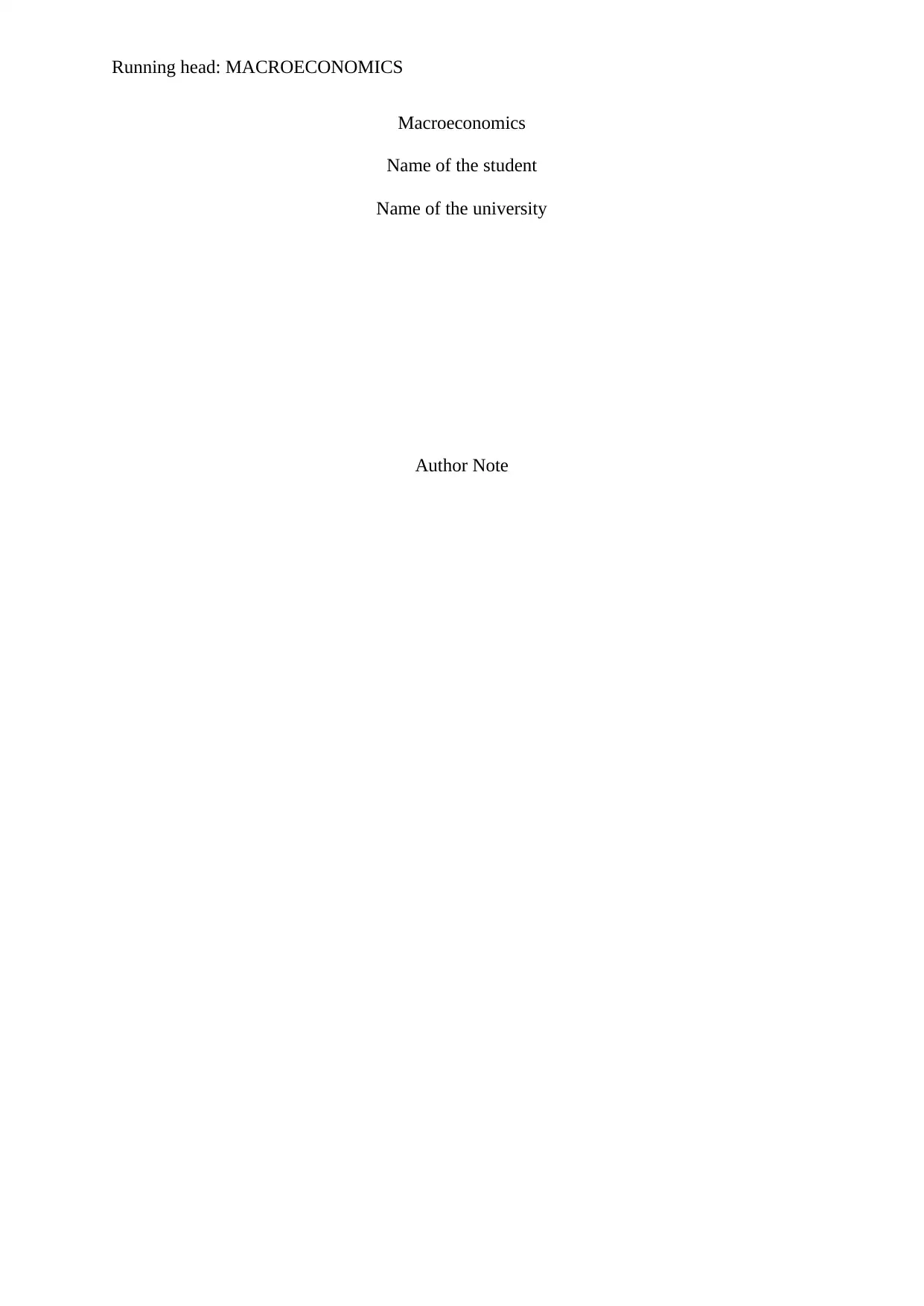
Running head: MACROECONOMICS
Macroeconomics
Name of the student
Name of the university
Author Note
Macroeconomics
Name of the student
Name of the university
Author Note
Paraphrase This Document
Need a fresh take? Get an instant paraphrase of this document with our AI Paraphraser
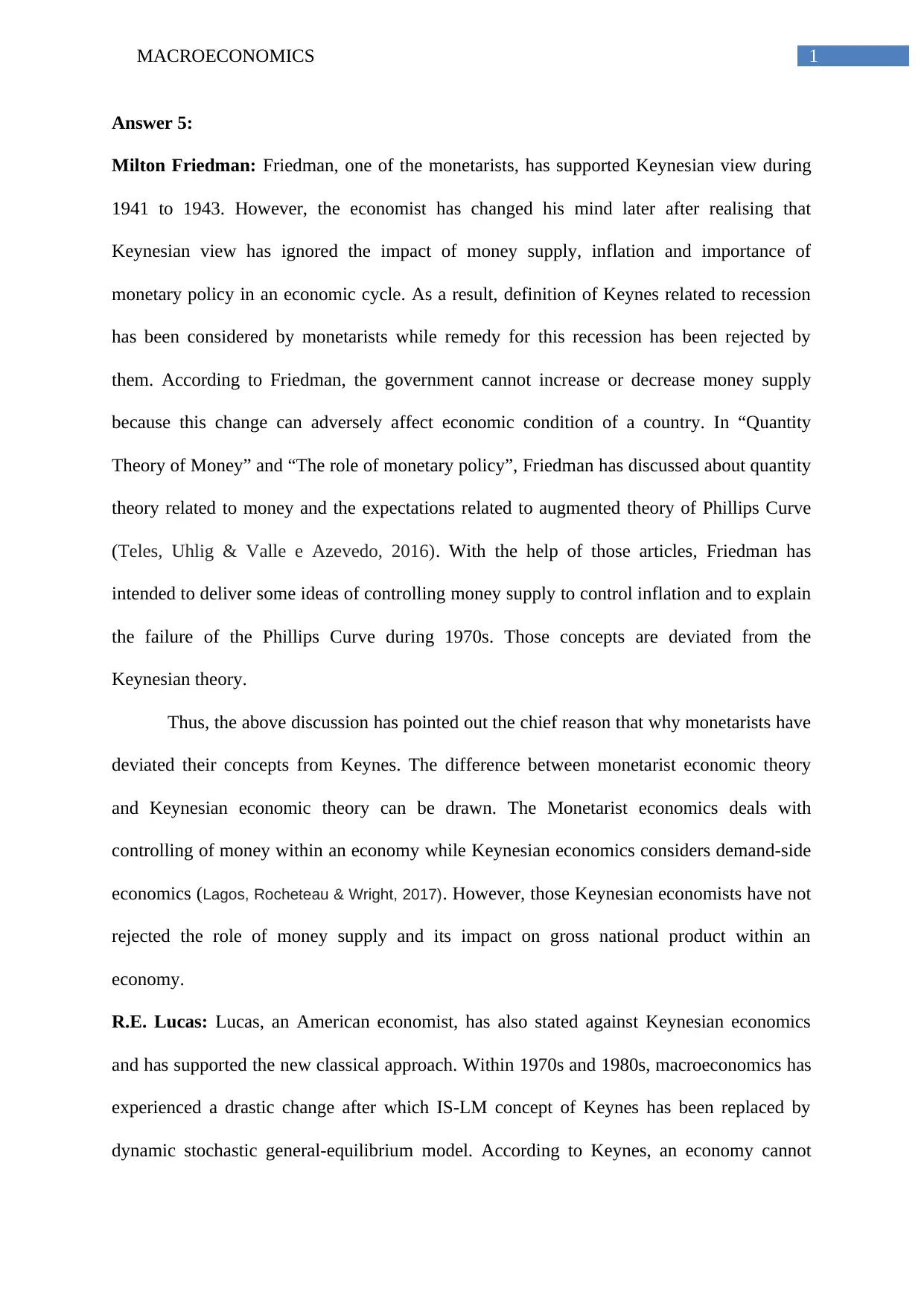
1MACROECONOMICS
Answer 5:
Milton Friedman: Friedman, one of the monetarists, has supported Keynesian view during
1941 to 1943. However, the economist has changed his mind later after realising that
Keynesian view has ignored the impact of money supply, inflation and importance of
monetary policy in an economic cycle. As a result, definition of Keynes related to recession
has been considered by monetarists while remedy for this recession has been rejected by
them. According to Friedman, the government cannot increase or decrease money supply
because this change can adversely affect economic condition of a country. In “Quantity
Theory of Money” and “The role of monetary policy”, Friedman has discussed about quantity
theory related to money and the expectations related to augmented theory of Phillips Curve
(Teles, Uhlig & Valle e Azevedo, 2016). With the help of those articles, Friedman has
intended to deliver some ideas of controlling money supply to control inflation and to explain
the failure of the Phillips Curve during 1970s. Those concepts are deviated from the
Keynesian theory.
Thus, the above discussion has pointed out the chief reason that why monetarists have
deviated their concepts from Keynes. The difference between monetarist economic theory
and Keynesian economic theory can be drawn. The Monetarist economics deals with
controlling of money within an economy while Keynesian economics considers demand-side
economics (Lagos, Rocheteau & Wright, 2017). However, those Keynesian economists have not
rejected the role of money supply and its impact on gross national product within an
economy.
R.E. Lucas: Lucas, an American economist, has also stated against Keynesian economics
and has supported the new classical approach. Within 1970s and 1980s, macroeconomics has
experienced a drastic change after which IS-LM concept of Keynes has been replaced by
dynamic stochastic general-equilibrium model. According to Keynes, an economy cannot
Answer 5:
Milton Friedman: Friedman, one of the monetarists, has supported Keynesian view during
1941 to 1943. However, the economist has changed his mind later after realising that
Keynesian view has ignored the impact of money supply, inflation and importance of
monetary policy in an economic cycle. As a result, definition of Keynes related to recession
has been considered by monetarists while remedy for this recession has been rejected by
them. According to Friedman, the government cannot increase or decrease money supply
because this change can adversely affect economic condition of a country. In “Quantity
Theory of Money” and “The role of monetary policy”, Friedman has discussed about quantity
theory related to money and the expectations related to augmented theory of Phillips Curve
(Teles, Uhlig & Valle e Azevedo, 2016). With the help of those articles, Friedman has
intended to deliver some ideas of controlling money supply to control inflation and to explain
the failure of the Phillips Curve during 1970s. Those concepts are deviated from the
Keynesian theory.
Thus, the above discussion has pointed out the chief reason that why monetarists have
deviated their concepts from Keynes. The difference between monetarist economic theory
and Keynesian economic theory can be drawn. The Monetarist economics deals with
controlling of money within an economy while Keynesian economics considers demand-side
economics (Lagos, Rocheteau & Wright, 2017). However, those Keynesian economists have not
rejected the role of money supply and its impact on gross national product within an
economy.
R.E. Lucas: Lucas, an American economist, has also stated against Keynesian economics
and has supported the new classical approach. Within 1970s and 1980s, macroeconomics has
experienced a drastic change after which IS-LM concept of Keynes has been replaced by
dynamic stochastic general-equilibrium model. According to Keynes, an economy cannot
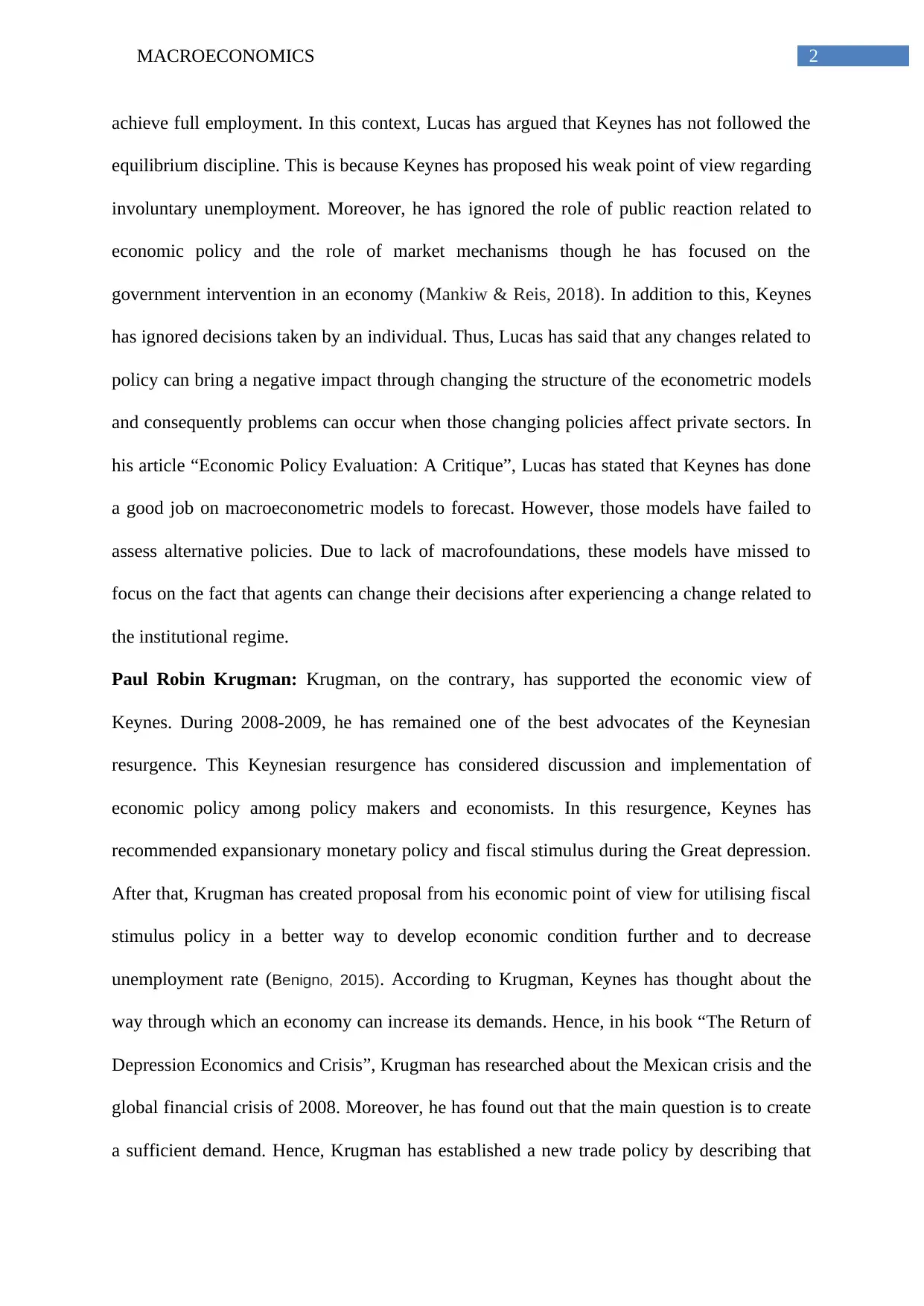
2MACROECONOMICS
achieve full employment. In this context, Lucas has argued that Keynes has not followed the
equilibrium discipline. This is because Keynes has proposed his weak point of view regarding
involuntary unemployment. Moreover, he has ignored the role of public reaction related to
economic policy and the role of market mechanisms though he has focused on the
government intervention in an economy (Mankiw & Reis, 2018). In addition to this, Keynes
has ignored decisions taken by an individual. Thus, Lucas has said that any changes related to
policy can bring a negative impact through changing the structure of the econometric models
and consequently problems can occur when those changing policies affect private sectors. In
his article “Economic Policy Evaluation: A Critique”, Lucas has stated that Keynes has done
a good job on macroeconometric models to forecast. However, those models have failed to
assess alternative policies. Due to lack of macrofoundations, these models have missed to
focus on the fact that agents can change their decisions after experiencing a change related to
the institutional regime.
Paul Robin Krugman: Krugman, on the contrary, has supported the economic view of
Keynes. During 2008-2009, he has remained one of the best advocates of the Keynesian
resurgence. This Keynesian resurgence has considered discussion and implementation of
economic policy among policy makers and economists. In this resurgence, Keynes has
recommended expansionary monetary policy and fiscal stimulus during the Great depression.
After that, Krugman has created proposal from his economic point of view for utilising fiscal
stimulus policy in a better way to develop economic condition further and to decrease
unemployment rate (Benigno, 2015). According to Krugman, Keynes has thought about the
way through which an economy can increase its demands. Hence, in his book “The Return of
Depression Economics and Crisis”, Krugman has researched about the Mexican crisis and the
global financial crisis of 2008. Moreover, he has found out that the main question is to create
a sufficient demand. Hence, Krugman has established a new trade policy by describing that
achieve full employment. In this context, Lucas has argued that Keynes has not followed the
equilibrium discipline. This is because Keynes has proposed his weak point of view regarding
involuntary unemployment. Moreover, he has ignored the role of public reaction related to
economic policy and the role of market mechanisms though he has focused on the
government intervention in an economy (Mankiw & Reis, 2018). In addition to this, Keynes
has ignored decisions taken by an individual. Thus, Lucas has said that any changes related to
policy can bring a negative impact through changing the structure of the econometric models
and consequently problems can occur when those changing policies affect private sectors. In
his article “Economic Policy Evaluation: A Critique”, Lucas has stated that Keynes has done
a good job on macroeconometric models to forecast. However, those models have failed to
assess alternative policies. Due to lack of macrofoundations, these models have missed to
focus on the fact that agents can change their decisions after experiencing a change related to
the institutional regime.
Paul Robin Krugman: Krugman, on the contrary, has supported the economic view of
Keynes. During 2008-2009, he has remained one of the best advocates of the Keynesian
resurgence. This Keynesian resurgence has considered discussion and implementation of
economic policy among policy makers and economists. In this resurgence, Keynes has
recommended expansionary monetary policy and fiscal stimulus during the Great depression.
After that, Krugman has created proposal from his economic point of view for utilising fiscal
stimulus policy in a better way to develop economic condition further and to decrease
unemployment rate (Benigno, 2015). According to Krugman, Keynes has thought about the
way through which an economy can increase its demands. Hence, in his book “The Return of
Depression Economics and Crisis”, Krugman has researched about the Mexican crisis and the
global financial crisis of 2008. Moreover, he has found out that the main question is to create
a sufficient demand. Hence, Krugman has established a new trade policy by describing that
⊘ This is a preview!⊘
Do you want full access?
Subscribe today to unlock all pages.

Trusted by 1+ million students worldwide
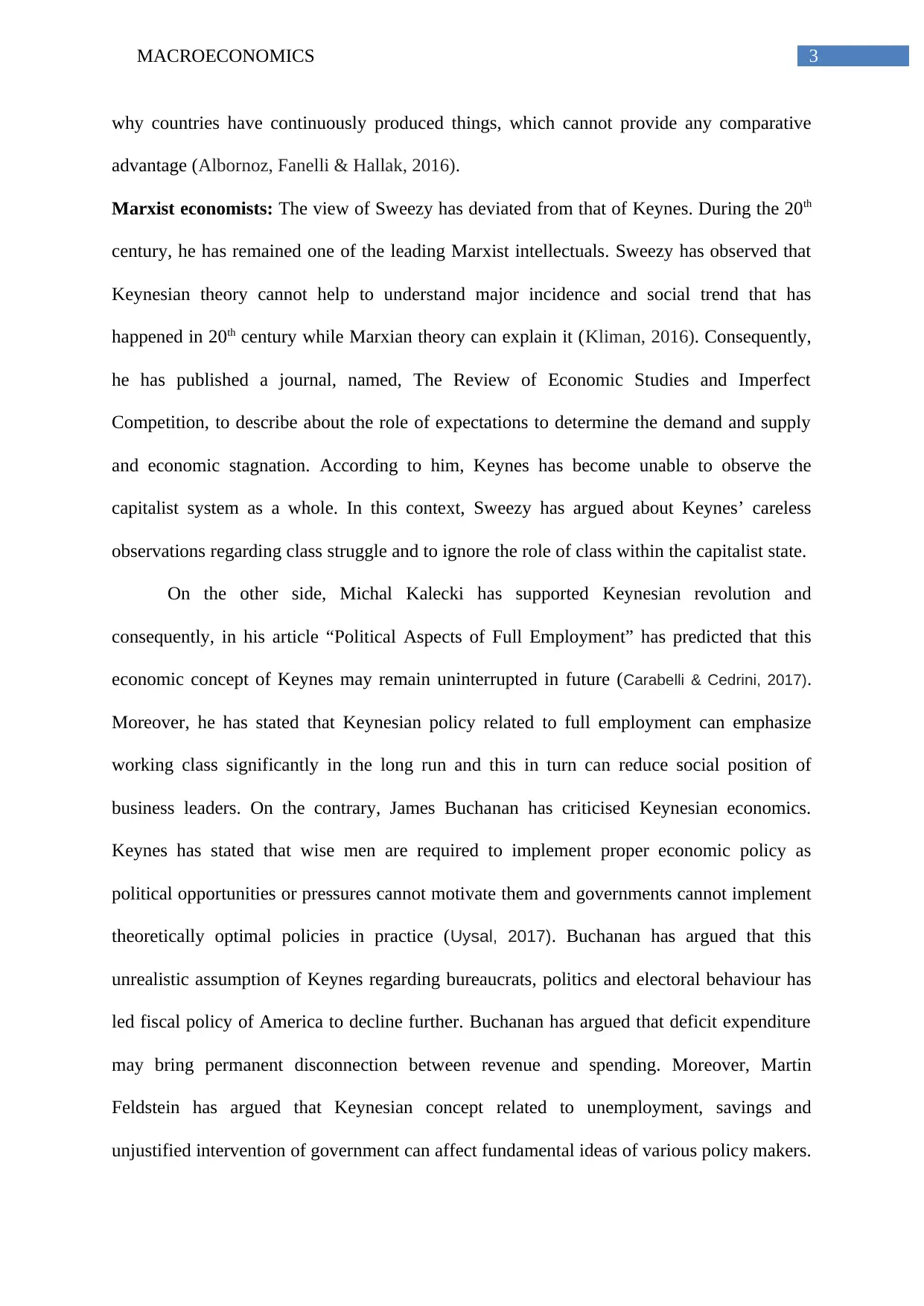
3MACROECONOMICS
why countries have continuously produced things, which cannot provide any comparative
advantage (Albornoz, Fanelli & Hallak, 2016).
Marxist economists: The view of Sweezy has deviated from that of Keynes. During the 20th
century, he has remained one of the leading Marxist intellectuals. Sweezy has observed that
Keynesian theory cannot help to understand major incidence and social trend that has
happened in 20th century while Marxian theory can explain it (Kliman, 2016). Consequently,
he has published a journal, named, The Review of Economic Studies and Imperfect
Competition, to describe about the role of expectations to determine the demand and supply
and economic stagnation. According to him, Keynes has become unable to observe the
capitalist system as a whole. In this context, Sweezy has argued about Keynes’ careless
observations regarding class struggle and to ignore the role of class within the capitalist state.
On the other side, Michal Kalecki has supported Keynesian revolution and
consequently, in his article “Political Aspects of Full Employment” has predicted that this
economic concept of Keynes may remain uninterrupted in future (Carabelli & Cedrini, 2017).
Moreover, he has stated that Keynesian policy related to full employment can emphasize
working class significantly in the long run and this in turn can reduce social position of
business leaders. On the contrary, James Buchanan has criticised Keynesian economics.
Keynes has stated that wise men are required to implement proper economic policy as
political opportunities or pressures cannot motivate them and governments cannot implement
theoretically optimal policies in practice (Uysal, 2017). Buchanan has argued that this
unrealistic assumption of Keynes regarding bureaucrats, politics and electoral behaviour has
led fiscal policy of America to decline further. Buchanan has argued that deficit expenditure
may bring permanent disconnection between revenue and spending. Moreover, Martin
Feldstein has argued that Keynesian concept related to unemployment, savings and
unjustified intervention of government can affect fundamental ideas of various policy makers.
why countries have continuously produced things, which cannot provide any comparative
advantage (Albornoz, Fanelli & Hallak, 2016).
Marxist economists: The view of Sweezy has deviated from that of Keynes. During the 20th
century, he has remained one of the leading Marxist intellectuals. Sweezy has observed that
Keynesian theory cannot help to understand major incidence and social trend that has
happened in 20th century while Marxian theory can explain it (Kliman, 2016). Consequently,
he has published a journal, named, The Review of Economic Studies and Imperfect
Competition, to describe about the role of expectations to determine the demand and supply
and economic stagnation. According to him, Keynes has become unable to observe the
capitalist system as a whole. In this context, Sweezy has argued about Keynes’ careless
observations regarding class struggle and to ignore the role of class within the capitalist state.
On the other side, Michal Kalecki has supported Keynesian revolution and
consequently, in his article “Political Aspects of Full Employment” has predicted that this
economic concept of Keynes may remain uninterrupted in future (Carabelli & Cedrini, 2017).
Moreover, he has stated that Keynesian policy related to full employment can emphasize
working class significantly in the long run and this in turn can reduce social position of
business leaders. On the contrary, James Buchanan has criticised Keynesian economics.
Keynes has stated that wise men are required to implement proper economic policy as
political opportunities or pressures cannot motivate them and governments cannot implement
theoretically optimal policies in practice (Uysal, 2017). Buchanan has argued that this
unrealistic assumption of Keynes regarding bureaucrats, politics and electoral behaviour has
led fiscal policy of America to decline further. Buchanan has argued that deficit expenditure
may bring permanent disconnection between revenue and spending. Moreover, Martin
Feldstein has argued that Keynesian concept related to unemployment, savings and
unjustified intervention of government can affect fundamental ideas of various policy makers.
Paraphrase This Document
Need a fresh take? Get an instant paraphrase of this document with our AI Paraphraser
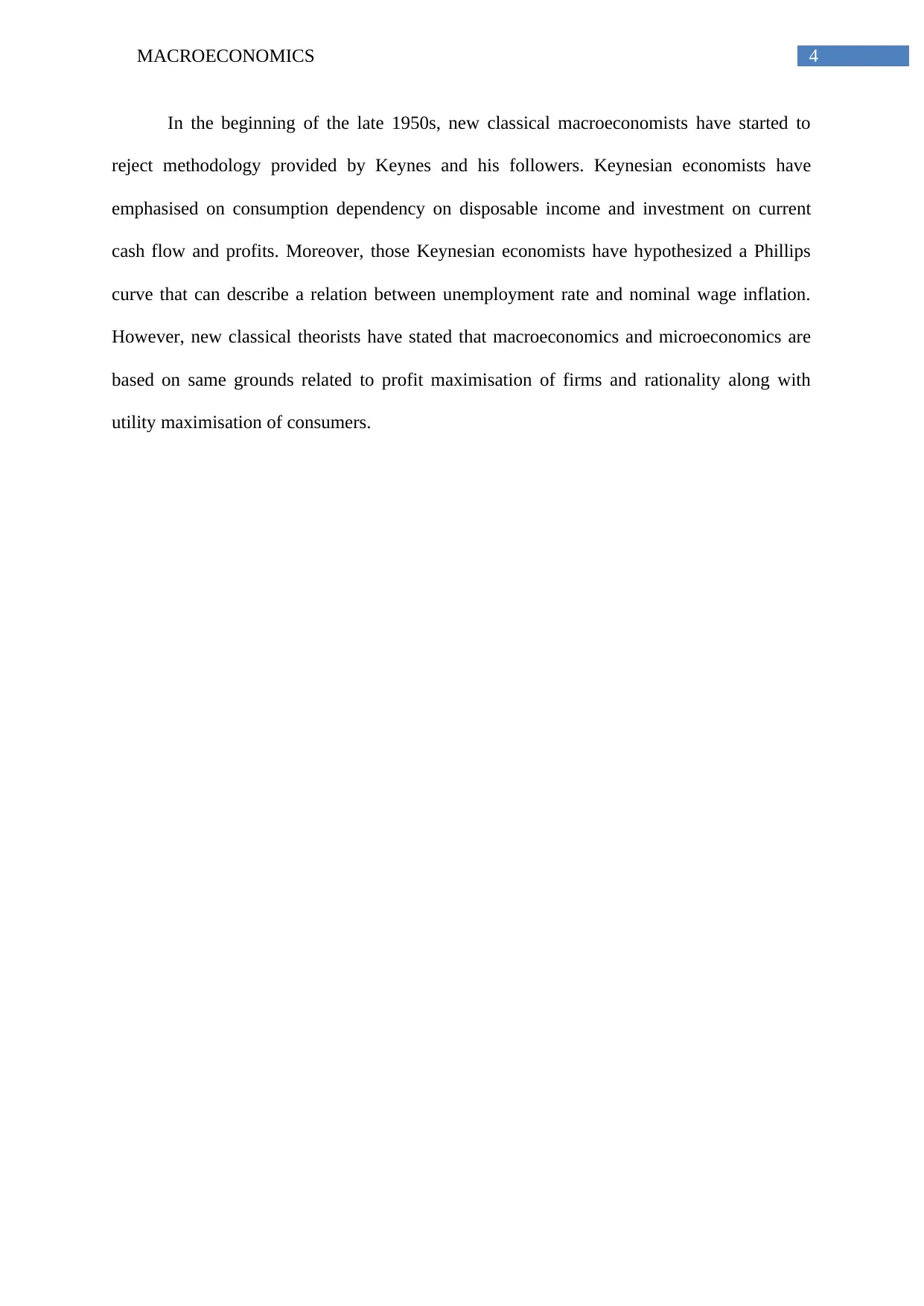
4MACROECONOMICS
In the beginning of the late 1950s, new classical macroeconomists have started to
reject methodology provided by Keynes and his followers. Keynesian economists have
emphasised on consumption dependency on disposable income and investment on current
cash flow and profits. Moreover, those Keynesian economists have hypothesized a Phillips
curve that can describe a relation between unemployment rate and nominal wage inflation.
However, new classical theorists have stated that macroeconomics and microeconomics are
based on same grounds related to profit maximisation of firms and rationality along with
utility maximisation of consumers.
In the beginning of the late 1950s, new classical macroeconomists have started to
reject methodology provided by Keynes and his followers. Keynesian economists have
emphasised on consumption dependency on disposable income and investment on current
cash flow and profits. Moreover, those Keynesian economists have hypothesized a Phillips
curve that can describe a relation between unemployment rate and nominal wage inflation.
However, new classical theorists have stated that macroeconomics and microeconomics are
based on same grounds related to profit maximisation of firms and rationality along with
utility maximisation of consumers.
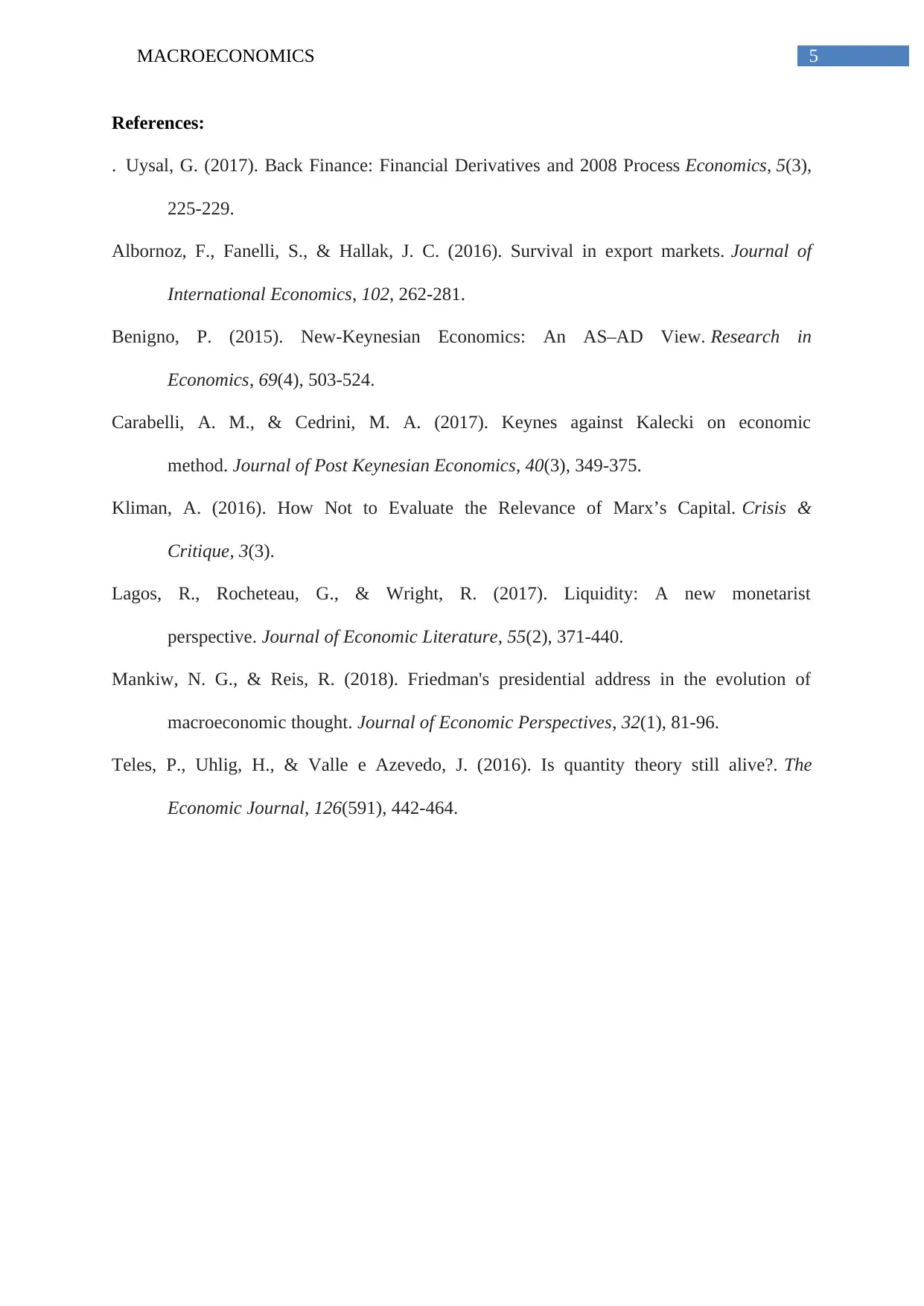
5MACROECONOMICS
References:
.Uysal, G. (2017). Back Finance: Financial Derivatives and 2008 Process Economics, 5(3),
225-229.
Albornoz, F., Fanelli, S., & Hallak, J. C. (2016). Survival in export markets. Journal of
International Economics, 102, 262-281.
Benigno, P. (2015). New-Keynesian Economics: An AS–AD View. Research in
Economics, 69(4), 503-524.
Carabelli, A. M., & Cedrini, M. A. (2017). Keynes against Kalecki on economic
method. Journal of Post Keynesian Economics, 40(3), 349-375.
Kliman, A. (2016). How Not to Evaluate the Relevance of Marx’s Capital. Crisis &
Critique, 3(3).
Lagos, R., Rocheteau, G., & Wright, R. (2017). Liquidity: A new monetarist
perspective. Journal of Economic Literature, 55(2), 371-440.
Mankiw, N. G., & Reis, R. (2018). Friedman's presidential address in the evolution of
macroeconomic thought. Journal of Economic Perspectives, 32(1), 81-96.
Teles, P., Uhlig, H., & Valle e Azevedo, J. (2016). Is quantity theory still alive?. The
Economic Journal, 126(591), 442-464.
References:
.Uysal, G. (2017). Back Finance: Financial Derivatives and 2008 Process Economics, 5(3),
225-229.
Albornoz, F., Fanelli, S., & Hallak, J. C. (2016). Survival in export markets. Journal of
International Economics, 102, 262-281.
Benigno, P. (2015). New-Keynesian Economics: An AS–AD View. Research in
Economics, 69(4), 503-524.
Carabelli, A. M., & Cedrini, M. A. (2017). Keynes against Kalecki on economic
method. Journal of Post Keynesian Economics, 40(3), 349-375.
Kliman, A. (2016). How Not to Evaluate the Relevance of Marx’s Capital. Crisis &
Critique, 3(3).
Lagos, R., Rocheteau, G., & Wright, R. (2017). Liquidity: A new monetarist
perspective. Journal of Economic Literature, 55(2), 371-440.
Mankiw, N. G., & Reis, R. (2018). Friedman's presidential address in the evolution of
macroeconomic thought. Journal of Economic Perspectives, 32(1), 81-96.
Teles, P., Uhlig, H., & Valle e Azevedo, J. (2016). Is quantity theory still alive?. The
Economic Journal, 126(591), 442-464.
⊘ This is a preview!⊘
Do you want full access?
Subscribe today to unlock all pages.

Trusted by 1+ million students worldwide
1 out of 6
Related Documents
Your All-in-One AI-Powered Toolkit for Academic Success.
+13062052269
info@desklib.com
Available 24*7 on WhatsApp / Email
![[object Object]](/_next/static/media/star-bottom.7253800d.svg)
Unlock your academic potential
Copyright © 2020–2026 A2Z Services. All Rights Reserved. Developed and managed by ZUCOL.





